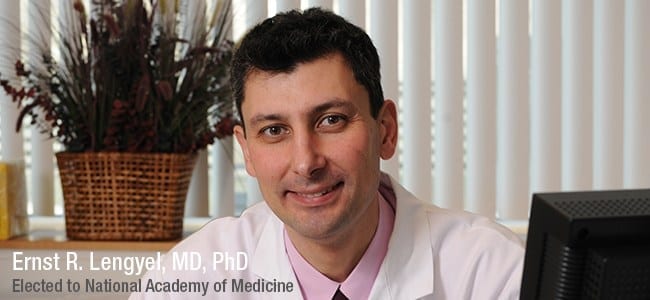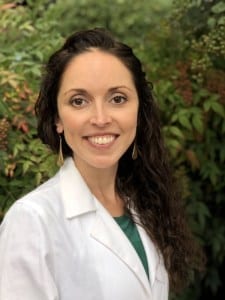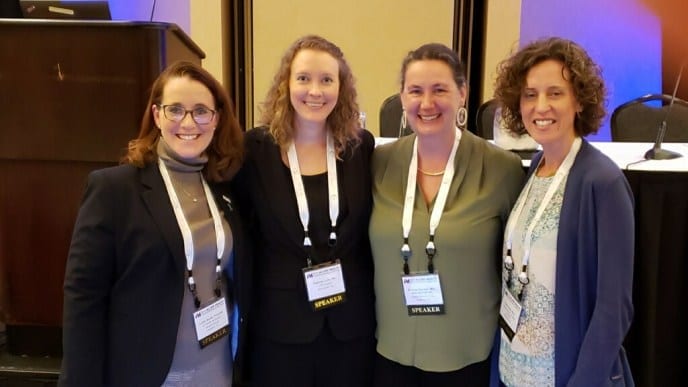
Ernst Lengyel elected to National Academy of Medicine
SGO commemorates golden anniversary with 2018-2019 Annual Report
Caring for the caregiver: Supporting trainees during the complex journey toward gynecologic oncology | Erica Weston, MD, MHS
SGO Allied Health Professionals Meeting breaks attendance record
GTN treatment featured in October Gynecologic Oncology journal
Ernst Lengyel elected to National Academy of Medicine
 Last week the National Academy of Medicine (NAM) announced the election of 90 regular members and 10 international members during its annual meeting, including SGO member Ernst Robert Lengyel, MD, PhD, the Arthur L. and Lee G. Herbst Professor of Obstetrics and Gynecology and chair, department of obstetrics and gynecology, at the University of Chicago. Election to the Academy is considered one of the highest honors in the fields of health and medicine and recognizes individuals who have demonstrated outstanding professional achievement and commitment to service. Dr. Lengyel was chosen by the NAM “for his leadership on the biology of ovarian cancer and research that has advanced knowledge of signaling in the tumor microenvironment.” Dr. Lengyel is the fifth NAM member to be elected for work in the field of gynecologic oncology. Previous inductees in the subspecialty of gynecologic oncology include Setsuko Chambers, MD; Beth Karlan, MD; Kunle Odunsi, MD, PhD, FRCOG, FACOG and Hedvig Hricak, MD, PhD.
Last week the National Academy of Medicine (NAM) announced the election of 90 regular members and 10 international members during its annual meeting, including SGO member Ernst Robert Lengyel, MD, PhD, the Arthur L. and Lee G. Herbst Professor of Obstetrics and Gynecology and chair, department of obstetrics and gynecology, at the University of Chicago. Election to the Academy is considered one of the highest honors in the fields of health and medicine and recognizes individuals who have demonstrated outstanding professional achievement and commitment to service. Dr. Lengyel was chosen by the NAM “for his leadership on the biology of ovarian cancer and research that has advanced knowledge of signaling in the tumor microenvironment.” Dr. Lengyel is the fifth NAM member to be elected for work in the field of gynecologic oncology. Previous inductees in the subspecialty of gynecologic oncology include Setsuko Chambers, MD; Beth Karlan, MD; Kunle Odunsi, MD, PhD, FRCOG, FACOG and Hedvig Hricak, MD, PhD.
SGO commemorates golden anniversary with 2018-2019 Annual Report
“Celebrating 50 Years of Progress” during the presidential term of Carol L. Brown, MD, the Society of Gynecologic Oncology has released the 2018-2019 SGO Annual Report. Highlights include the 50th SGO Annual Meeting on Women’s Cancer in Honolulu, SGO’s efforts to address the opioid crisis, the elevation of the Advanced Practice Provider Task Force to a full committee, and other SGO statements and white papers that were released during the past year. The SGO Annual Report also includes an audited financial report of revenue and expenses documenting the financial health of the organization.
Caring for the caregiver: Supporting trainees during the complex journey toward gynecologic oncology | Erica Weston, MD, MHS
I accidentally went on a hike – a metaphor for my medical training. I didn’t always know I wanted to be a doctor, or specifically gyn oncologist, but rather I think about my path as a series of doors of opportunity that I walked through over the years, choosing to continue on this path that I find both challenging and immensely rewarding. The most difficult part of training for me is the limited time, and mental space for processing the challenges specific to caring for cancer patients and navigating the at times complex terrain of life as a medical trainee. The hiking metaphor was brought up during a Caring for the Caregiver session, a new support program incorporated into our fellowship curriculum.

Erica Weston, MD, MHS
Our hospital implemented a psychological first aid program called RISE (Resilience In Stressful Events)1,2 in 2011 to provide acute support to employees who have encountered stressful, patient-related events. The program was adapted to provide facilitated peer support surrounding both sentinel medical events, and everyday work and life stressors, and incorporated into our fellowship curriculum in early 2019 in partnership with the palliative medicine program. We meet biweekly with a chaplain and palliative care fellow for facilitated peer support, which consists of sharing of both stressors and joys, and providing reflective listening as a group.
During one of these meetings, the chaplain was discussing his work with medicine interns during their first month of residency. He described an intern who, when asked how he was feeling, responded, “I am not sure how it started, but I feel like I accidentally went on a hike.” This sentence resonated with me–in the past I have actually planned a short walk and inadvertently embarked on a long hike and experienced the uncertainty, fatigue and great satisfaction of finishing a climb. It articulated the feeling of constant climbing with periods of reprieve, rest, and a sense of accomplishment that make up the months and years of training and practicing medicine. This reflective listening not only articulated the shared experience between the medicine interns and me, at the end of my formal training, it also provided me the words to articulate my personal experience on this journey.
Through these facilitated discussions, I learn a great deal from the strengths and struggles of my peers. I also benefit from probing questions from both the facilitators and my colleagues asking me to reflect on why I feel a certain way, or how I would respond to a situation that they found themselves in. I also find a great salve in taking the time for sharing, and personal and group reflection. By setting aside time, and facilitating discussion, we emphasize the need for processing, for unpacking, and ultimately for growth and improvement in handling similar situations in the future. As I continue through my final year of training, I know the steep inclines will come and I will keep climbing equipped with a few more tools to help along the way.
Erica Weston, MD MHS is a third year gynecologic oncology fellow with the Kelly Gynecologic Oncology Service, at Johns Hopkins School of Medicine in Baltimore, MD.
References:
- Edrees H, Connors C, Paine L, Norvell M, Taylor H, Wu AW. Implementing the RISE second victim support programme at the Johns Hopkins Hospital: A case study. BMJ Open. 2016;6(9). doi:10.1136/bmjopen-2016-011708
- Caring for the Caregiver: The RISE (Resilience in Stressful Events) Program. Armstrong Institute for Patient Safety and Quality. Published 2019. Accessed October 6, 2019.
SGO Allied Health Professionals Meeting breaks attendance record

From left: SGO 2019 Allied Health Professionals Meeting course directors Judith Smith, Kathryn Lyle, Evonne Kandas and presenter Karen Lyle.
The SGO 2019 Allied Health Professionals Meeting, held Oct. 18-20 in Rosemont, IL, broke an attendance record for the 8th year in a row with a total of 177 participants. Co-course director Evonne Kandas, RN, MS, WHCNP, FNP-BC, noted that several sessions were new to this year’s meeting, including a genetics focus with three separate lectures.
“This topic-focused segment gave the audience a general overview of genetic testing followed by specific uses in practice,” said Kandas. Participants “had the opportunity to ask direct questions to the speakers which often generated discussion even amongst the presenters.”
Co-course director Katie Lyle, RN, MS, WHNP-BC, explained how the landscape of gynecologic oncology is rapidly changing and genetic testing is now being used to guide treatment decisions for patients. “The meeting attendees left with a good knowledge foundation on what genetic testing is and what role it plays in managing our patients,” she said. “Not only did they receive education on the basics of cancer genetics, but they also heard lectures on how this information directs treatment selection and how the APP can be involved in this process.”
Kandas, Lyle, and co-course director Judith A. Smith, PharmD, BCOP, CPHQ, FCCP, FISOPP, FHOPA, also planned this year’s meeting with a strong pharmacology focus. She noted that the pharmacology sessions were included with the main conference, instead of presented in a separate pre-conference session, as they were last year.
“It allowed participants to obtain pharmacology CMEs without having to register for a separate session as well as obtaining a more substantial amount of total CME credits,” Kandas explained. “There was good participation throughout all three of the conference days which allowed more contact and interaction amongst the attendees.”
Kandas noted that the “411 on the New Class of PARP Inhibitors” session also generated a lot of interest and discussion.
“Several attendees reported that their practices have already adopted the use of PARP inhibitors in maintenance therapy for ovarian cancer,” she said. “There was definitely interest in the PARP lecture in that participants were informed on the differences in the pharmacokinetics of the medications that are currently FDA approved, their drug and food interactions and the management of their side effects.”
“The Allied Health meeting was a great way for APPs to learn how PARP inhibitors are being used in various practices across the country,” said Lyle. “That’s really the value of a meeting like this; having the opportunity to discuss with peers how therapies with new indications are being adopted and implemented into practice.”
Lyle added that the sessions on Palliative Care and Navigating Difficult Conversations also sparked a lot of interest among attendees. “This topic is relevant to anyone who works in the field of gynecologic oncology and attendees valued the opportunity to learn new skills and techniques that they can take with them to implement in their own practices,” she said.
Kandas said the meeting offered an opportunity for participants to exchange ideas and share clinical experiences with peers from across the country in order to help build a strong network of allied health members in gynecologic oncology and within SGO.
“Our hope from this year’s Allied Health [Professionals] Meeting is that participants, whether new to the field of gynecologic oncology or seasoned practitioners, have an understanding and appreciation of the multiple layers of knowledge and skills that are required in the care of gynecologic oncology patients; ranging from diagnosis, surgical care, chemotherapy/immunotherapy management and palliative care; as well as supporting the future direction of the specialty and identifying their role as a member of the patient’s health care team,” she said.
GTN treatment featured in October Gynecologic Oncology journal
Editor’s Choice: When to stop human chorionic gonadotrophin (hCG) surveillance after treatment with chemotherapy for gestational trophoblastic neoplasia (GTN): A national analysis on over 4,000 patients Kirsty Balachandran, Abdulazeez Salawu, Ehsan Ghorani, Baljeet Kaur, Neil J. Sebire, Dee Short, Richard Harvey, Barry Hancock, John Tidy, Kamaljit Singh, Naveed Sarwar, Matthew C. Winter, Michael J. Seckl
Editorial: Continued hCG surveillance following chemotherapy for gestational trophoblastic neoplasia: When is enough enough? Kevin M. Elias, MD, Ross S. Berkowitz, MD Neil S. Horowitz, MD
